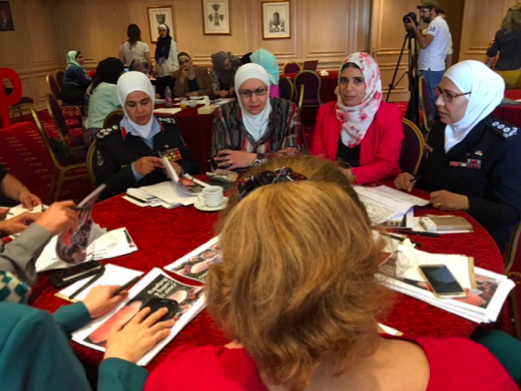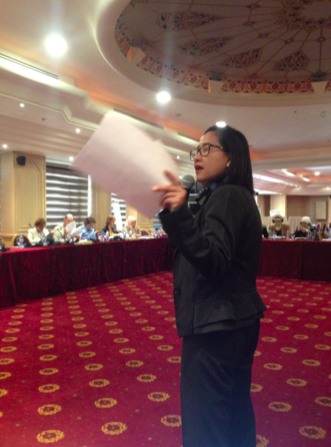NAP Costing and Budgeting workshop in Jordan: Bringing the NAP one step closer to effective implementation
By Mavic Cabrera-Balleza and Agnieszka Fal Dutra Santos
There are now 63 National Action Plans (NAP) on the UN Security Council Resolution (UNSCR) 1325 on Women, Peace and Security. Out of these, there are only 12 NAPs that have earmarked budget for implementation. The lack of dedicated budget is one of the reasons for weakness in implementation. There are a number of reasons why most NAPs don’t have dedicated budget: Governments do not consider it a priority. Sometimes they do not have the technical capacity to properly cost the NAP. In a few situations where there is budget for the NAP, the cost of civil society’s participation in implementation is not included.
To respond to this situation, the Global Network of Women Peacebuilders (GNWP) developed a training module on NAP Costing and Budgeting. Piloted in Georgia in November 2015, the module has been further developed and customised to the NAP process in Jordan. In coordination with the Jordanian National Commission for Women (JNCW) and UN Women Jordan GNWP facilitated a NAP costing and budgeting workshop in Jordan.
The NAP process in Jordan
Jordan began the process of drafting a NAP when the JNCW established the National Coalition for the Implementation of UNSCR 1325 (Coalition). The Coalition is composed of representatives of civil society, government agencies and the security sector. In 2012, the JNCW submitted its first draft of a Jordanian NAP; however, due to the fact that the draft was developed with limited local engagement, and was not coupled with awareness-raising efforts, it has remained under review by the Government of Jordan for three years.
In September 2015, the Government of Jordan committed to accelerating the adoption of the NAP. Welcoming this commitment, the JNCW in collaboration with UN Women initiated a participatory process to develop and implement a Jordanian National Action Plan (JONAP). Throughout January and February 2016, the JNCW and UN Women held a series of local consultations with stakeholders across Jordan to identify priorities and recommendations for JONAP. Building on the recommendations raised at the consultations, in April and May 2016, the Coalition, with technical support from the Institute for Inclusive Security, drafted the logical framework, including activities, outcomes and outputs.
In this context, UN Women Jordan invited GNWP to provide technical support to the Coalition to cost the NAP and start the budgeting process. Aware of the lack of earmarked funding for NAPs as one of the factors that hinder effective implementation, JNCW and UN Women wanted to ensure that the JONAP is properly costed and therefore implementable. The costing and budgeting workshop was a critical step towards the completion of the JONAP.
Figure 1: Jordanian NAP stateholders discussing cost of activities.
Overview of the workshop
The costing and budgeting workshop in Jordan integrated the module, piloted by GNWP and Cordaid in Georgia, adapting it to the Jordanian reality. To ensure that all sessions are well-adjusted to the Jordanian context, GNWP enlisted help of two local experts – a government financing expert, Dr. Naif Al-Ibrahem, and Gender-Responsive Budgeting (GRB) expert, Ms. Arwa Al-Najdawi. The GNWP consulted with the experts prior to the workshop, while preparing its materials. The local experts also delivered sessions during the workshop, and served as resource persons, supporting the facilitation and responding to the participants’ questions.
The participatory workshop included sessions on the funding landscpae for women and peace and security; resource mobilisation and resource mapping; gender-responsive budgeting; and a presentation on the government’s budgeting process, strucure and system. Another important feature of the NAP Costing and Budgeting workshop is the hands-on exercise using a costing template especially developed by GNWP. The costing template is aligned with the JONAP logframe and reflect all the activities, outputs, and activities from the existing draft JONAP logframe. It also integrates the costs for conducting monitoring and evaluation of the JONAP.
Figure 2: GNWP's Mavic Cabrera-Balleza leading the session on the international WPS financing climate
The costing exercise helped the participants refine the activities, to ensure they are more specific and realistic, and therefore actionable. The Coalition will continue to refine the activities. GNWP also recommended to JNCW and UN Women Jordan that a special Costing and Budgeting team be formed to finalise the costing and develop a JONAP budget.
Another important outcome of the NAP Costing and Budgeting workshop in Jordan was the formation of the NAP Costing and Budgeting team composed of representatives of the JNCW; civil society; the General Budget Department in the Ministry of Finance; a GRB expert; security sector; and UN Women. Although the team has not yet convened since the workshop in August, its responsibility to finalise the budget and seeing it through until it is approved has been defined by the Coalition.
The two-day NAP Costing and Budgeting workshop in Jordan was part of a four-day event, organised by Jordan national women’s machinery. The event also included sessions on monitoring and evaluation and coordination among actors involved in national action planning for WPS, facilitated by the Institute for Inclusive Security (IIS). Representatives of Serbia’s Ministry of Defense and UN Women Serbia also attended the workshop. Serbia is currently developing the second phase of its NAP.
Challenges and lessons learned
Each costing and budgeting workshop provides GNWP with an opportunity to refine and improve its costing and budgeting workshop module, by testing its adaptability to different contexts. By learning from each of these experiences, GNWP ensures that the module is a relevant tool for stakeholders developing National Action Plans around the world.
Some of the challenges and lessons learned from the workshop in Jordan include:
- One challenge was the short workshop day in Jordan. Each workshop day started at 9am and finished at 2pm, and the participants were very reluctant to stay later than that. As a result, GNWP divided its module (initially designed for one day) into two separate days. The two-day workshop turned out to work very well, with the first day devoted to building the Coalition’s technical capacity, and the second focused on the practical costing exercise. The homework, given by GNWP to participants on Day 1 also proved helpful, since it allowed the participants to prepare themselves for the costing exercise.
- Another challenge was the large group GNWP had to conduct costing with. JONAP’s broad-based approach is its definite strength, and the Coalition is a reflection of this participatory process. There are over forty members on the Coalition, and each workshop day was attended by at least thirty participants. While commendable in terms of ensuring an inclusive process, working with such a big team on a very specific task was a challenge. Dividing the participants into smaller groups for the costing exercised helped mitigate it. However, it was also challenging that most participants were not decision-makers and did not have financial/budgeting expertise. In the future, even if the costing is done with a larger group, representatives from the Ministry of Finance/Budgeting Department and higher level officials should also be invited for the costing and budgeting workshop.
- Since the GNWP costing and budgeting workshop followed a day-long session on developing a Monitoring and Evaluation plan for a NAP, the Coalition was able to cost not only the outcomes of the JONAP, but also its Monitoring and Evaluation plan. While this may require more work to be done prior to costing, in general, it is a good model that could be applied in future costing and budgeting workshops.
Recommendations and next steps
Recommendations for next steps on JONAP costing
- Smaller group to further work on the log frame and refine the activities –It would be most practical to assign the finalisation of the draft logframe to a smaller group. The primary tasks of this smaller group would be to add more details to the logframe and refine the activities. This smaller group may be composed of the following: representatives from JNCW, CSOs, security sector and UN Women.
- Costing and Budgeting team - To ensure coherence between the activities and their costs and to limit the back-and-forth, and number of reviews, GNWP suggest that the same group that refines activities could also be included in the Costing and Budgeting team. The only additions to the team, who would join at the costing process (after the activities have been finalised), would be the representitives the Ministry of Finance and a Costing and Budgeting/GRB expert.
- Costing validation - GNWP suggested that the entire JONAP Coalition be convened after the log frame is completed and costing is done, to present the full draft of the JONAP, solicit comments and make final revisions.
GNWP next steps
- The most important next step for GNWP is the documentation of the lessons learned from the JONAP costing and budgeting workshop. The lessons learnt will be captured in two ways:
- First, by including the report from the NAP Costing and Budgeting workshop in Jordan in the NAP Costing and Budgeting manual;
- Second, in a training video prepared by GNWP. GNWP hired a videographer to document the workshop in Jordan. The documentation will be suplemented by interviews with experts, and a detailed training on the use of the costing template. The video will serve as an additional resource for NAP costing and budgeting.
- GNWP is committed to seeing the Jordan costing process to its end, and will continue to virtually support the process, by providing its expert advice and guidance.
- GNWP hopes to conduct the next NAP Costing and Budgeting workshop in the first quarter of 2017. Several countries including the Democratic Republic of Congo, Nepal, Sierra Leone and Sudan expressed interest to undergo the NAP Costing and Budgeting workshop.
______________________________________________________________________________
An additional two pager on the National Action Plan on Women, Peace and Security (NAP) Costing and Budgeting workshop in Jordan, can be found here.


